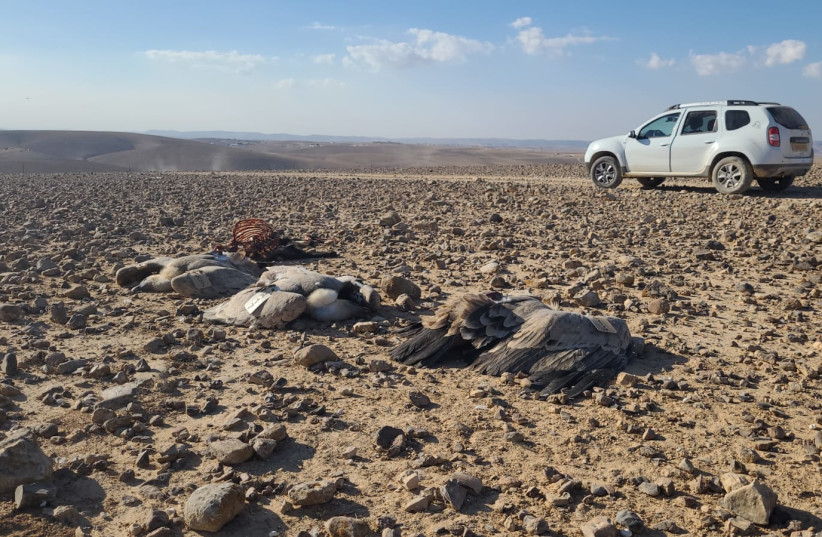Three poisoned vultures were found in Israel's South on Wednesday in the same area where nine other dead vultures were found on Sunday, bringing the total number to 12 and effectively culling the Israeli vulture population by 6%, the Nature and Parks Authority revealed.
One of the vultures, a two-year-old designated T66, was found near the bodies of two dead dogs.
"This is the largest poisoning incident of vultures in Israel in 14 years," Nature and Parks Authority Director-General Shaul Goldstein said, calling on Environmental Protection Minister Tamar Zandberg to promote legislation against poisoning by monitoring the use of toxins in agriculture.
"Tonight, the Nature and Parks Authority will conduct an emergency assessment and distribute a plan to deal with the state of poisoning in order to ensure that vultures remain in the country."
The nine dead vultures found Sunday in the south of the country, near Nahal Kina and Nahal Kamir, were discovered after information regarding the poisoning was received by the authority via chips that had been placed on the birds.

Upon receiving the data transmitted by the chips, Nature and Park Authority inspectors traveled to the area and discovered the nine vulture carcasses, along with the remains of a goat, which is suspected to have been the source of the poisoning.
Both the goat and the birds will be taken to a veterinary institute in Beit Dagan for further inspection. Inspectors are scanning the area for further information and evidence, along with a poison-detection dog. An investigation into the incident has been opened by the authority, at the end of which, a complaint will be filed with the police.
On the chance that there is poisoned meat still in the area, feeding stations have been set up close by in order to prevent additional birds from ingesting the poison.
"This is a very serious and difficult event which significantly harms the vulture population in the South," a spokesperson for the Nature and Parks Authority said.
Responding to the incident, the Society for the Protection of Nature in Israel (SPNI) highlighted the extent to which the poison attack has damaged the vulture population.
"Today there are around 200 vultures in Israel. Nine vultures account for almost 5% of the entire population in the country," the organization stated.
"The poisoning of vultures continues, and each time we are shocked anew," the statement continued. "Until the law is changed, it will be very difficult to catch the perpetrators – and even if they are caught, it is doubtful whether they will be prosecuted."
In November 2020, a report published by the Environmental Protection Ministry stated that "malicious poisoning incidents are the biggest and most crucial threat to the existence of vultures in our country. Of the 213 vultures injured between 2001 and 2015, about 40% were affected by poisoning incidents. Seventy-four deaths from unknown causes must also be added to this, as it is estimated they were caused by poison."
Vultures maintain steady life-long monogamous relationships and raise their chicks together, making the effect of the poisoning severe.
In 2019, a man was arrested in the Golan Heights for poisoning eight endangered vultures.
In 2014, a vulture was among 25 wild animals killed in another intentional poisoning attack.
It is not just vultures that are affected every year by intentional poisoning, however. An estimated 20 wild animals, including an endangered white-tailed eagle, were killed in July through the deliberate use of an illegal pesticide.
A study conducted by the Science Division of the Nature and Parks Authority has shown that on average, there are 120 malicious poisoning attempts each year, causing a death toll in the hundreds. Most of the poisonings are carried out through the use of illegal pesticides, with the perpetrator spreading it on food which the unwary animals ingest.
It is estimated that since the 1950s, the extinction of several species in the region has been directly caused by the use of poisonous pesticides.
Hagay Hacohen contributed to this report.
